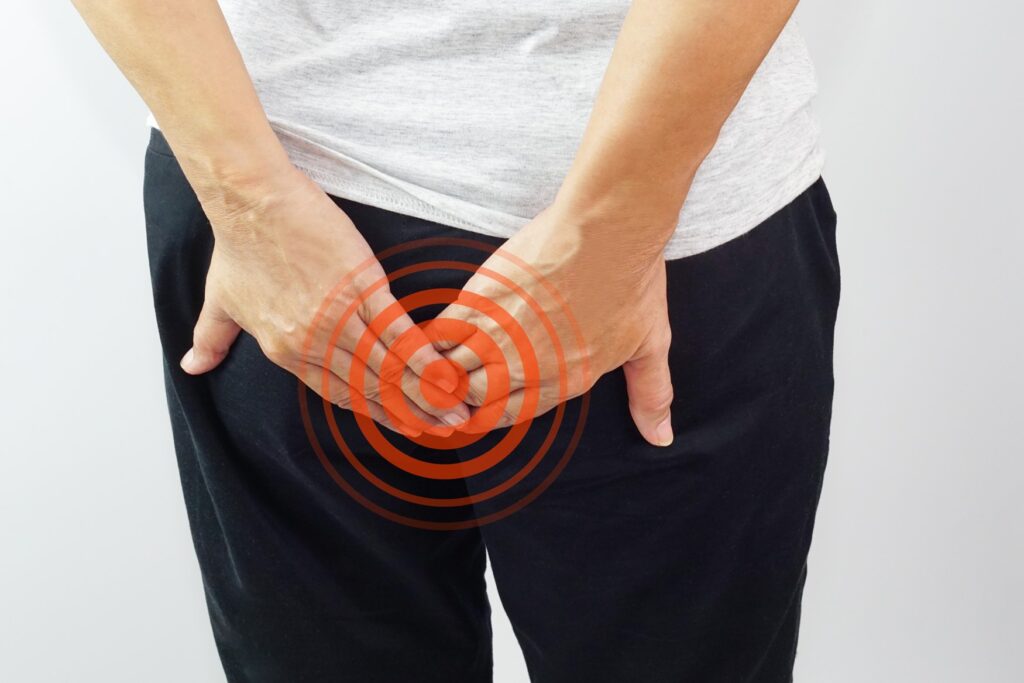Hemorrhoids (piles) are swollen or enlarged veins that form inside your rectum or outside of your anus.
They are common in every individual, but they do not bother us at baseline. They produce irritation, pain, and rectal bleeding when they get swollen.
Symptoms often improve with home treatments, but some may also require medical help.
Symptoms:
Internal hemorrhoids rarely cause pain (and typically can’t be felt) unless they prolapse. Many people with internal hemorrhoids don’t know they have them because they don’t have symptoms.
Signs of external hemorrhoids:
- Itchy anus
- Hard lumps near your anus that feel sore or tender
- Pain or ache in your anus, especially when you sit
- Rectal bleeding
Prolapsed hemorrhoids can be painful and uncomfortable. You may be able to feel them bulging outside of your anus and gently push them back inside.
Causes:
The major causes for hemmorhoids include:
- Sitting on the toilet for long periods of time
- Straining during bowel movements
- Chronic constipation or diarrhea
- Consuming low-fiber diet
- Aging and pregnancy (weaken the supporting tissue of anus and rectum)
- Frequently lifting heavy objects
Diagnosis:
This helps in diagnosis of hemorrhoids:
- Evaluates your medical history
- Will perform a physical examination (around the anus)
- Will perform a digital rectal examination to check for internal hemorrhoids (a lubricated, gloved finger is inserted into the rectum to feel for any abnormality)
Anoscopy helps check and evaluate for internal hemorrhoids if any
Home Remedies:
Below are some home remedies that helps manage hemorrhoids at home:
- Eat foods that are high in fiber
- Take a stool softener or a fiber supplement
- Drink enough fluids every day
- Avoid straining during bowel movements
- Avoid on the toilet for long periods of time
- Take over-the-counter pain relievers
- Take warm baths (sitz bath) several times a day to help relieve pain
Using over-the-counter hemorrhoid creams, ointments, or suppositories to relieve mild pain, swelling, and itching of external hemorrhoids
Treatment:
If home remedies for hemorrhoids don’t help you, you may need a medical procedure. There are several different procedures that your doctor suggest. These procedures use different techniques to cause scar tissue to form in the hemorrhoids. This cuts off the blood supply, which usually shrinks the hemorrhoids. In severe cases, you may need surgery.
Surgery:
Types of Hemorrhoid Surgery
Outpatient Procedures:
- Banding: Rubber band ligation for Grade 1-3 hemorrhoids, cutting off blood supply.
- Sclerotherapy: Chemical injection to shrink Grade 1-2 hemorrhoids.
- Coagulation Therapy: Infrared, heat, or cold to shrink Grade 1-3 hemorrhoids.
- Hemorrhoidal Artery Ligation: Ultrasound-guided vessel closure for Grade 2-3 hemorrhoids.
Inpatient Procedures:
- Hemorrhoidectomy: Removes large, prolapsed, or non-responsive Grade 3-4 hemorrhoids under anesthesia.
- Hemorrhoidopexy (Stapling): Repositions and staples prolapsed Grade 3-4 hemorrhoids, cutting off blood supply.
These surgeries vary in invasiveness, recovery time, and pain.

